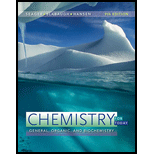
Concept explainers
Interpretation:
The IUPAC name for fructose is to be stated when the alcohol groups are called as hydroxys.
Concept introduction:
The systematic naming of organic compound is given by IUPAC. The naming of organic compound is done in such a way that the structure of organic compound is correctly interpreted from the name.
Rules for writing the structural formula from IUPAC are:
• First identify the word root for the given compound.
• The suffix used in the compound like –ane, ene, yne, ol, al and so on.
• Identify the position, location, and number of the substituent bonded to the carbon chain.
Want to see the full answer?
Check out a sample textbook solution
Chapter 14 Solutions
Chemistry for Today: General, Organic, and Biochemistry
- Don't used hand raiting and don't used Ai solutionarrow_forwardDon't used hand raiting and don't used Ai solutionarrow_forward* How many milliliters of 97.5(±0.5) wt% H2SO4 with a density of 1.84(±0.01) g/mL will you need to prepare 2.000 L of 0.110 M H2SO4? * If the uncertainty in delivering H2SO4 is ±0.01 mL, calculate the absolute uncertainty in the molarity (0.110 M). Assume there is negligible uncertainty in the formula mass of NaOH and in the final volume (2.000 L) and assume random error.arrow_forward
- You are tasked with creating a calibration curve for the absorbance of cobalt solutions of various concentrations. You must prepare 5 standards with concentrations between 1.00 mg/L and 10.0 mg/L Co2+. You have a stock solution with a concentration of 40 mg/L Co2+ and all the standard lab glassware including transfer pipets and flasks. Explain how you would make your 5 standard solutions of various concentrations, including what glassware you would use to measure and prepare each solution.arrow_forwardPredict the product and write the mechanism. CH3-CH=CH-CH2-CH3 + NBS- hv CCl4arrow_forwardHow exactly is carbon disulfide used in industry? Specifically, where does it come in during rubber or textile production and what is the chemical processes?arrow_forward
- A researcher has developed a new analytical method to determine the percent by mass iron in solids. To test the new method, the researcher purchases a standard reference material sample that is 2.85% iron by mass. Analysis of the iron standard with the new method returns values of 2.75%, 2.89%, 2.77%, 2.81%, and 2.87%. Does the new method produce a result that is significantly different from the standard value at the 95% confidence level?arrow_forwardCreate a drawing of an aceral with at least 2 isopropoxy groups, and a total of 11 carbon atomsarrow_forward4. Predict the major product(s) for each of the following reactions. HBr (1 equiv.) peroxide, A a. b. NBS, peroxide, Aarrow_forward
- In addition to the separation techniques used in this lab (magnetism, evaporation, and filtering), there are other commonly used separation techniques. Some of these techniques are:Distillation – this process is used to separate components that have significantly different boiling points. The solution is heated and the lower boiling point substance is vaporized first. The vapor can be collected and condensed and the component recovered as a pure liquid. If the temperature of the mixture is then raised, the next higher boiling component will come off and be collected. Eventually only non-volatile components will be left in the original solution.Centrifugation – a centrifuge will separate mixtures based on their mass. The mixture is placed in a centrifuge tube which is then spun at a high speed. Heavier components will settle at the bottom of the tube while lighter components will be at the top. This is the technique used to separate red blood cells from blood plasma.Sieving – this is…arrow_forwardBriefly describe a eutectic system.arrow_forward13.53 Draw all stereoisomers formed when each compound is treated with HBr in the presence of peroxides. a. b. C.arrow_forward
 Chemistry for Today: General, Organic, and Bioche...ChemistryISBN:9781305960060Author:Spencer L. Seager, Michael R. Slabaugh, Maren S. HansenPublisher:Cengage Learning
Chemistry for Today: General, Organic, and Bioche...ChemistryISBN:9781305960060Author:Spencer L. Seager, Michael R. Slabaugh, Maren S. HansenPublisher:Cengage Learning Chemistry & Chemical ReactivityChemistryISBN:9781133949640Author:John C. Kotz, Paul M. Treichel, John Townsend, David TreichelPublisher:Cengage Learning
Chemistry & Chemical ReactivityChemistryISBN:9781133949640Author:John C. Kotz, Paul M. Treichel, John Townsend, David TreichelPublisher:Cengage Learning Organic And Biological ChemistryChemistryISBN:9781305081079Author:STOKER, H. Stephen (howard Stephen)Publisher:Cengage Learning,
Organic And Biological ChemistryChemistryISBN:9781305081079Author:STOKER, H. Stephen (howard Stephen)Publisher:Cengage Learning, General, Organic, and Biological ChemistryChemistryISBN:9781285853918Author:H. Stephen StokerPublisher:Cengage Learning
General, Organic, and Biological ChemistryChemistryISBN:9781285853918Author:H. Stephen StokerPublisher:Cengage Learning Chemistry: The Molecular ScienceChemistryISBN:9781285199047Author:John W. Moore, Conrad L. StanitskiPublisher:Cengage Learning
Chemistry: The Molecular ScienceChemistryISBN:9781285199047Author:John W. Moore, Conrad L. StanitskiPublisher:Cengage Learning Organic Chemistry: A Guided InquiryChemistryISBN:9780618974122Author:Andrei StraumanisPublisher:Cengage Learning
Organic Chemistry: A Guided InquiryChemistryISBN:9780618974122Author:Andrei StraumanisPublisher:Cengage Learning





